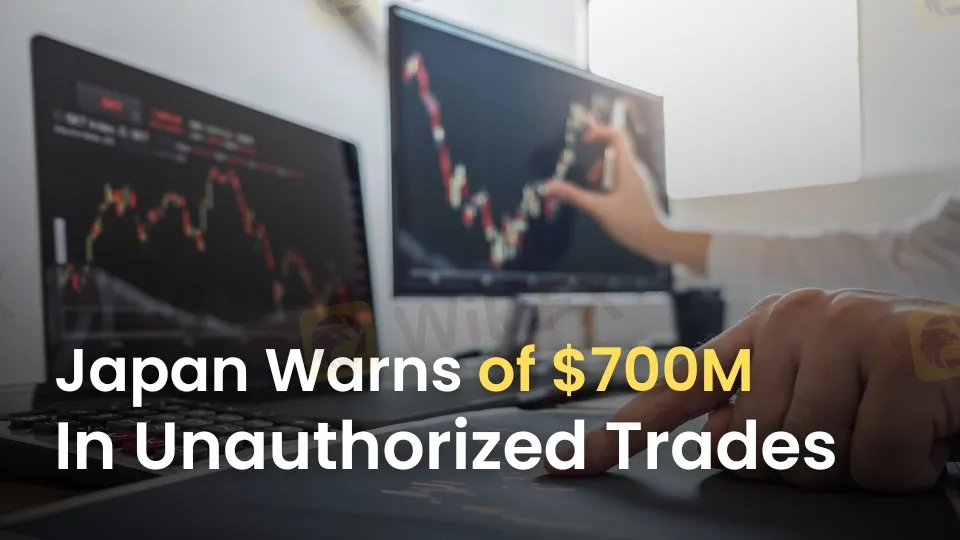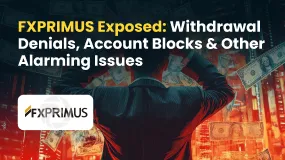简体中文
繁體中文
English
Pусский
日本語
ภาษาไทย
Tiếng Việt
Bahasa Indonesia
Español
हिन्दी
Filippiiniläinen
Français
Deutsch
Português
Türkçe
한국어
العربية
Japan Issues Urgent Warning on $700M Unauthorized Trades
Abstract:Japan's FSA warns of $700M in unauthorized trades from phishing attacks on brokerage accounts. Cybersecurity threats continue to rise in the country.

Japans Financial Services Agency (FSA) recently raised a red flag over a troubling spike in unauthorized trading linked to compromised brokerage accounts. This wave of cybercrime hinges on pilfered customer details snatched largely through deceptive phishing websites that masquerade as trusted securities companies.
The FSA points out that this troubling pattern of unauthorized trading has gained momentum, turning online trading platforms into prime targets for cybercriminals. These attacks often stem from phishing schemes that lure users into surrendering confidential account details. Crafted to mimic authentic brokerage sites, these fraudulent pages dupe people into handing over sensitive information without a second thought.
By April 16, 2025, the FSA had tallied reports from 12 securities firms caught up in this mess. The financial toll? Around $350 million in sales and $315 million in purchases through illicit trades. Hackers typically seize control of accounts, offload stocks, and funnel the profits into Chinese shares, leaving those assets stranded in victims portfolios—a messy aftermath for traders and firms alike.
The stats are grim. More than 3,300 accounts have been breached, with 1,454 shady transactions logged. Big names like Rakuten Securities, Nomura Holdings, SMBC Nikko Securities, and SBI Holdings are among the hardest hit. These companies are teaming up with the FSA to tackle the crisis, and the agency assures that brokerages will foot the bill for their clients losses.

Japan‘s cybersecurity woes aren’t isolated. Last year, at the Munich Cyber Security Conference, an official from the National Center of Incident Readiness and Strategy for Cybersecurity warned that hackers tied to China are zeroing in on vital systems—think telecoms and internet networks. This broader threat looms large over Japans current predicament.
Since early 2025, phishing scams have exploded, especially in Japan. Just in the first 16 days of April, brokerages clocked 736 unauthorized trades—a steep jump from 685 across all of March and a mere 33 in February. The rapid climb signals an intensifying problem, with cybercriminals relentlessly targeting financial institutions.
To fight back, the Japan Securities Dealers Association is pressing firms to beef up defenses. They‘re advocating for tougher account authentication, like multi-factor verification, to lock down customer data and block further breaches. It’s a practical step toward keeping hackers at bay.
Still, the FSA worries that some incidents might remain under the radar. The true scope of this cyber onslaught is still unfolding, and the agency is calling for heightened awareness and teamwork among regulators, brokerages, and everyday traders to blunt its impact.
In short, Japan is wrestling with a sharp uptick in cyber threats, where phishing and hacked trading are shaking up the financial world. The FSA guarantees that firms will cover customer losses, but the pressing need for stronger security can‘t be ignored. With phishing attacks surging, Japan’s financial sector must stay sharp and proactive to weather this storm.

Disclaimer:
The views in this article only represent the author's personal views, and do not constitute investment advice on this platform. This platform does not guarantee the accuracy, completeness and timeliness of the information in the article, and will not be liable for any loss caused by the use of or reliance on the information in the article.
Read more

Investing in Coinexx? Think Again Before Your Account Balance Hits ZERO
Coinexx has emerged as a nightmare for traders who once saw potential and profit in its platform. The problems lie in its lack of transparency, which has left many investors with a ZERO balance. Scamming investors by employing fraudulent tactics and introducing bogus trading rules is increasingly becoming its status symbol. The endless negative reviews of this scam broker are trending on various platforms. To expose the troubling investor experiences, we’ve compiled sharp complaints from verified users of Coinexx. Read on!

UnityFXLive: How This Broker Scammed Over $350,000 ? Know the Red Flags
On August 4, 2025 Indian police arrested two men for running a fake forex trading scam under the name UnityFXLive.com. The suspects were caught operating from a rented office in Goregaon, Mumbai. During questioning, they revealed the name of a third person who is believed to be the mastermind behind the scam. He is currently on the run. The scammers promised people high returns on forex investments, but instead of doing real trading, they stole the money using fake online platforms.

FXPRIMUS Exposed: Withdrawal Denials, Account Blocks & Other Alarming Issues
Have your fund withdrawal applications been constantly denied by FXPRIMUS? Does the forex broker inappropriately block your trading account? Are your deposits disappearing without reaching your trading account? There’s something seriously wrong with this forex broker, whose track record keeps getting worse by the day. Many traders have expressed their anguish on several broker review platforms. While reading those reviews, we could not resist exposing this broker. Check out how traders have criticized FXPRIMUS for its illicit acts.

FXPRIMUS Exposed: Withdrawal Denials, Account Blocks & Other Alarming Issues
Have your fund withdrawal applications been constantly denied by FXPRIMUS? Does the forex broker inappropriately block your trading account? Are your deposits disappearing without reaching your trading account? There’s something seriously wrong with this forex broker, whose track record keeps getting worse by the day. Many traders have expressed their anguish on several broker review platforms. While reading those reviews, we could not resist exposing this broker. Check out how traders have criticized FXPRIMUS for its illicit acts.
WikiFX Broker
Latest News
Forex Swaps Explained in 5 Minutes – Everything You Need to Know
Telegram vs WhatsApp vs Discord: Which Platform Is Best for Forex Signals?
Investment Scam Alert: FCA Identifies 15 Scam Brokers
BaFin Issues Consumer Alerts Against Unauthorised Platforms
Retired Man Loses Life Savings to ‘Sister Duo’ in Forex Scam
Exploring Laxmii Forex: Kharadi's Financial Hub
TradexMarkets: 5 Troubling Signs You Shouldn’t Ignore
A Guide to Buy Stop vs Buy Limit in Forex Trading
SEC Implements New Rules for Crypto-Asset Service Providers
Binance Users Convert Crypto and Withdraw Instantly to Mastercard
Currency Calculator


